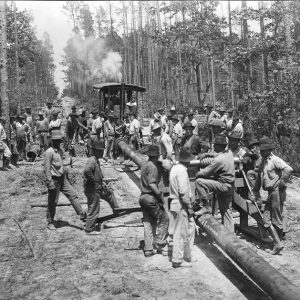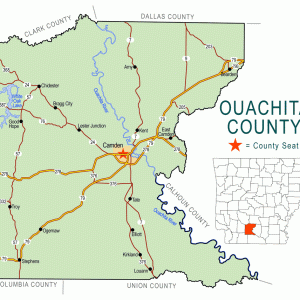calsfoundation@cals.org
Louann (Ouachita County)
| Latitude and Longitude: | 33°23’27″N 092°47’31″W |
| Elevation: | 135 feet |
| Area: | 0.24 square miles (2020 Census) |
| Population: | 153 (2020 Census) |
| Incorporation Date: | September 22, 1923 |
Historical Population as per the U.S. Census:
|
1810 |
1820 |
1830 |
1840 |
1850 |
1860 |
1870 |
1880 |
1890 |
1900 |
|
– |
– |
– |
– |
– |
– |
– |
– |
– |
– |
|
1910 |
1920 |
1930 |
1940 |
1950 |
1960 |
1970 |
1980 |
1990 |
2000 |
|
– |
– |
910 |
492 |
291 |
261 |
245 |
282 |
158 |
195 |
|
2010 |
2020 |
|
|
|
|
|
|
|
|
|
164 |
153 |
|
|
|
|
|
|
|
|
Louann is a town on State Highway 7 in southern Ouachita County, a short distance north of the Ouachita River. Although it began to be settled late in the nineteenth century, it was incorporated in the midst of the oil industry boom of the 1920s. With the onset of the Depression, the oil industry lost its momentum in southern Arkansas, and Louann gradually dwindled in size.
Quapaw from the north and Caddo from the west sometimes visited the Ouachita River valley. The river became a corridor for French explorers and trappers before the land became part of the United States through the Louisiana Purchase in 1803. Gradually, the pine forests were removed, and cotton plantations were established. William Deason, John Wells, and John Jones bought land near the Louann area in 1860 and 1861.
A post office was established at Louann in 1891. Ironically, the name Wells was considered for the settlement before Louann was chosen. The name undoubtedly was meant to honor the Wells family and did not refer to the oil wells that would appear thirty years in the future. That same year (1891), the Camden line of the St. Louis, Iron Mountain and Southern Railroad was completed to El Dorado (Union County), passing through Louann and establishing a depot at the settlement.
A small business district had developed in Louann before the discovery of a large field of oil in southern Ouachita and northern Union counties. Like its neighbor, Smackover (Union County), Louann exploded with population, as oil wells were built in and around the community. At least eight wells were dug within the town limits of Louann, which incorporated as a town in 1923.
The Gilliland Oil Company built most of the new housing in the town. During the 1920s, the town had three hotels, three grocery stores, two drugstores, a dry goods store, a bank, a hardware store, a garage to service automobiles, a bowling alley, and a public school campus that consisted of five or six shotgun buildings. A Presbyterian church was also established around this time. The railroad, which had been acquired by the Missouri Pacific Railroad in 1917, ran two daily routes from El Dorado to Louann, stopping at other oil towns along the way.
The oil boom was already beginning to decline when the Depression hit. The Louann State Bank closed in 1929. The population, counted as 910 in the 1930 census, declined to 492 in 1940 and 291 in 1950. The school consolidated into Smackover’s school district. Many of the businesses closed or relocated. The former school building burned in 1975.
The population in 2010 was 164, including 129 white and twenty-seven African American residents; by 2020, the population was 153. The town has a Baptist church and a florist’s shop.
For additional information:
Snider, Roy. “During the Boom: A Teenager’s Life.” Ouachita County Historical Quarterly 39 (Fall 2007): 19–23.
Steven Teske
Butler Center for Arkansas Studies
 Louann Pipeline
Louann Pipeline  Ouachita County Map
Ouachita County Map 




My grandmother was a cousin by marriage to Louann Wells, who married Lee Shirey. My grandmother was Annette Shirey Wells. Louann would carry water to the workers on the railroad at the time, who stayed in her parents’ farmhouse a mile away. When the railroad was finished, the depot was named Louann in honor of her kindness. Louann went on to marry Lee Shirey. They and some local businessmen purchased many acres of land and sold lots of 25 feet wide for $1,000 and became quite wealthy. Oil was discovered, and my grandmother’s father gave her and other children homeplaces with oil wells on them. My grandmother leased her land and oil rights to Carter Oil Company for five years, and they became Standard Oil Company. My grandmother and family left Louann in 1922 because the town became quite rowdy. My daddy was James Louis Wells, born in 1913 in New London, Arkansas. All of this is a true story that I have known all my life. My grandparents and parents are buried in Mer Rouge, Louisiana, where we moved to later in life. A distant cousin of mine is Jeannie Wells Clements. She is a great-niece of Louann and gave an interview at the dedication of Louann’s historic marker; the dedication was attended by State Rep. John Dawson of Camden and other officials.